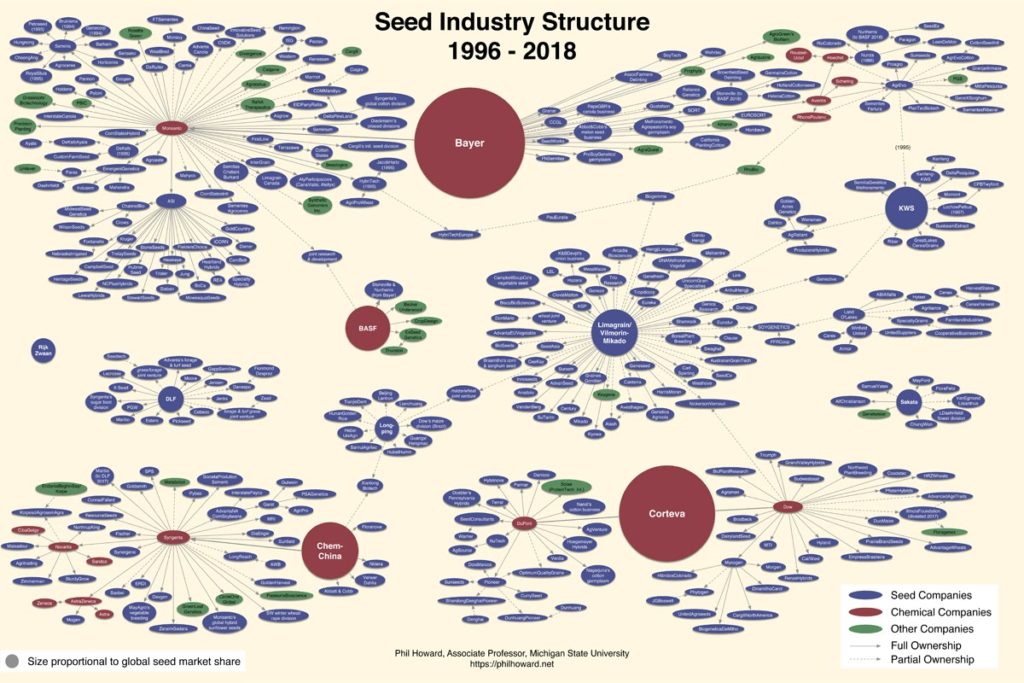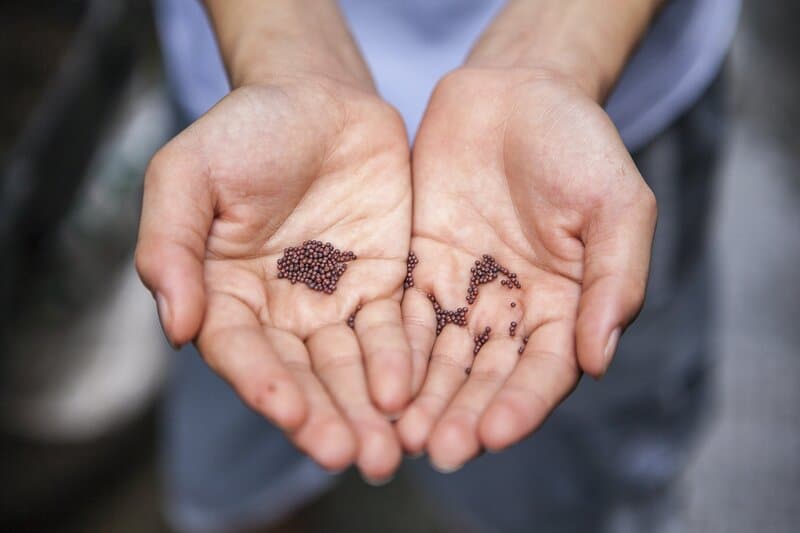We have been made well aware of a possible impending global food security crisis- in a warming world, will we be able to produce enough food for everyone on the planet? Where will this food come from? But rarely do we think of the companies behind the food production and how their actions influence food supply. Four companies control more than 60% of the global market, and experts say that these seed company mergers pose major risks to our food supply and reduces agriculture’s ability to respond to climate change.
—
In the last few years, there have been many stories of seed company mergers. There was Monsanto’s rejected attempts to buy Syngenta and a USD$130 billion merger between DuPont and Dow. Then, in 2016, a Chinese company called ChemChina acquired Syngenta for $43 billion. Also in 2016, Bayer acquired Monsanto for $63 billion. Below is the seed industry structure as of 2018:
You might also like: How We Can Reduce Our Carbon Footprint in Four Steps- Report

(Source: Professor Philip M. Howard)
Shockingly, while the mergers mentioned above received the most media attention and public resistance, Howard’s latest report found that 2018 brought 56 other acquisitions and joint ventures involving other top seed companies, including Limagrain’s Vilmorin-Mikado subsidiary in France and Longping High-Tech in China, which acquired Dow’s maize division in Brazil. Both ChemChina and Longping High-Tech are planning more acquisitions of seed companies in China.
According to Professor Howard’s analysis, two years after genetically engineered (GE) varieties were introduced in 1996, by 1998 the large agribusiness companies had started buying up smaller firms to accumulate more intellectual property (IP) rights. By 2008, Monsanto’s patented genetics alone were planted on 80% of US corn acres, 86% of cotton acres, and 92% of soybean acres. Today, these percentages are even higher.
While these mergers have economic ramifications, they have social ones, too. Because of the gene and crop patents that these seed companies own, farmers are often unable to save seeds for the next season, which allows the companies to increase prices, which results in a higher percentage of farmer profits going to seed purchases than before and lowers profit margins per acre for farmers. This puts upward pressure on farm size, which often contributes to simplified farming practices that lead to environmental harm.
The Need for Crop Diversity
Climate change is threatening crop production, and studies show that it may already be reducing the productivity of some major crops, including wheat. Climate change is also increasing the frequency and severity of extreme weather events, like floods, as well as increased pest invasions, which not only harms the crops, but also crop pollinators.
A key element of resilience against climate change is crop genetic diversity; however, when large industrial agriculture companies exert their influence, diversity is generally reduced, which means fewer types of crops. With increased mergers and acquisitions, this will likely get worse.
A study of crops yields in various levels of diverse conditions shows that yields were on average 7% and 22% higher for corn and soybeans respectively, that were grown in more diverse crop rotations under hot and dry conditions. Greater drought tolerance has also been observed with increased varieties of a single crop in Ethiopia.
Large seed companies divert their attention to a small number of major crops, like corn, soybeans and cotton. This is a problem because many of the crops that have been replaced by corn and soybeans, like sorghum, millet, pigeon peas and cassava, are more climate resilient. Further, within the crops they favour, there is poor genetic diversity, because it is more expensive and time-consuming to produce many diverse locally adapted varieties.
Additionally, these seed company mergers could lead to a reduction in research. Brett Bergemann, Monsanto’s COO, says, “The crop chemicals industry is bound to consolidate because target companies are spending too much on research and development for new products.”
An industry has lost its competitive character when the concentration ratio of the top four firms is 40% or higher. The seed industry continues to exceed this, not only across the entire global supply, but across crop types as well. For example, even before the Big 4 merged, three firms (Monsanto, Syngenta, and Vilmorin) controlled 60% of the global vegetable seed market.
Finally, studies suggest that increased market domination removes companies’ incentive to innovate. The US Department of Agriculture’s data confirms this, saying that fewer players mean less innovation. According to the report, as the seed industry became smaller, private research “dropped or slowed” and those companies that survived consolidation are “sponsoring less research relative to the size of their individual markets than when more companies were involved.”
What Can We Do to Combat Seed Company Mergers?
Small-scale and indigenous farmers have developed, nurtured, conserved and traded diverse local crop varieties for thousands of years and are essentially the stewards of the genetic diversity we need to continue to adapt to a changing climate. Unfortunately, large seed companies will continue to displace or absorb small and peasant farms, so it is vital that we support these small-scale farmers at all costs.
Additionally, antitrust law enforcement and oversight in the US needs to be strengthened so as not to allow a handful of firms to amass the enormous market, economic and political power over the global seed supply that is being shown now. A lack of oversight means that it is up to the public to demand action and resist companies that put the sustainability and security of our food and farming future at risk. We must also demand and support more investment in public plant breeding programs that are responsive to the needs of regional and resilient farming systems that support the health of both people and the planet.
Seeds represent profound potential for improving our food and agricultural systems. Plants can be bred to thrive without pesticides and to naturally resist disease, and to be adaptable to changing climates and environmental conditions; they can also be bred to improve the quality of our food. But to realise this, we must create structural changes to how seed is managed and shared.
Featured image by: Flickr

















